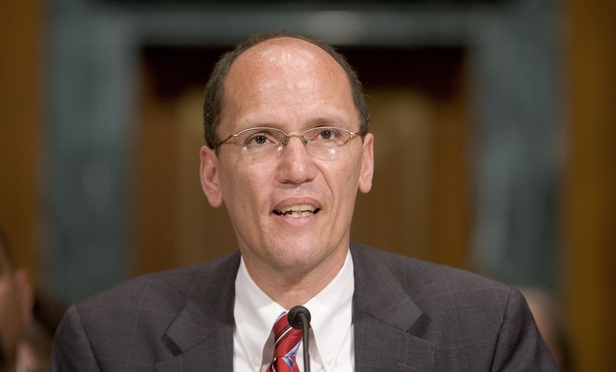Leading the charge for the industry groups is Bryan Cave partner Philip Bartz, a former U.S. Justice Department lawyer who has found success fighting federal regulators.
In 2010, Bartz represented Old Mutual Financial Network in its challenge of the U.S. Securities and Exchange Commission’s Rule 151A, which established jurisdiction over indexed annuities. The U.S. Court of Appeals for the D.C. Circuit vacated the rule on the grounds that the SEC’s analysis was arbitrary and capricious. At DOJ, Bartz served as deputy assistant attorney general for the Civil Division’s federal programs branch, which litigates on behalf of about 100 federal agencies.
U.S. Justice Department attorneys Emily Sue Newton and Galen Thorp, both of the federal programs branch, are defending the Labor Department. A 2010 graduate of the George Washington University Law School, Newton clerked in the U.S. Court of Federal Claims and served as a State Department lawyer before joining the Justice Department in 2015. Thorp has gained some notoriety this year in backing the League of Women Voters’ quest for a preliminary injunction preventing Kansas, Alabama and Georgia from requiring voters to provide documents proving their U.S. citizenship.
The main issues
In the buildup to Thursday’s hearing, the National Association for Fixed Annuities has argued that the Labor Department lacks authority to abandon a 40-year-old regulatory framework for retirement advice—the Employee Retirement Income Security Act. NAFA argues the rule would also improperly categorize insurance agents as fiduciaries.
The challengers zero in on the chief means of enforcing the Labor Department rule: a provision that allows investors to file class actions when they believe an adviser has not acted in their best interests. According to plaintiffs, the rule creates a private right of action that Congress never authorized.
“What the Labor Department is trying to do here is, through the back door, tell IRA providers that they have fiduciary duties because they have to enter into a contract for these products,” Sweeney of Miller & Chevalier said. “The Labor Department has no business regulating IRAs and trying to impose fiduciary duties, and it’s outside their authority.”
The Justice Department argues the rule is needed to address rampant conflicts of interest that have arisen as the market for retirement investment advice has evolved in the last four decades.
“Until now, investment advisors have been able to operate under financial conflicts and retirement investors have been paying the price of their tainted advice,” Justice Department lawyers wrote in court papers. “This is the problem the rule and exemptions seek to ameliorate, and NAFA has not shown that it is entitled to enjoin the solution DOL crafted to do so.” The Justice Department contends NAFA “asks for relief that would prolong and sustain the ongoing harm to retirement investors.”
What to expect
There’s no certainty U.S. District Judge Randolph Moss will rule Thursday on whether to hand down a preliminary injunction. He could rule from the bench and issue a written opinion soon thereafter—or publish a ruling in the coming weeks.
“Preliminary injunctions are hard to get,” said Kent Mason, a partner at Davis & Harman, a Washington firm that represents financial companies, “but NAFA has presented a very strong case, and we certainly hope that the court recognizes the compelling need for a time out here while the court evaluates the merits of the case.”
Dennis Kelleher, president and chief executive of Better Markets said NAFA is “just an industry group trying to kill a rule requiring them to put their clients’ best interest first.”
Fixed indexed annuity products identified in the Labor Department rule, Kelleher said, “are treated differently because they are loaded with conflicts of interest [and charge] huge commissions of 6% to 8%.”
Micah Hauptman, financial services counsel at the Consumer Federation of America, said fixed indexed annuities have “seriously detrimental features” for retirement savers.
“Tomorrow’s case is about insuring retirement savers have the necessary protections so that when a financial professional recommends a fixed-indexed annuity, it is because it is in the saver’s best interest not because it is in the financial professional’s self-interest,” Hauptman said.
What’s next
The Washington case is one of several pending in U.S. federal district courts.
The initial hearing in the Kansas case, brought by the insurer Market Synergy, had been set for Aug. 24 but was pushed back to Sept. 21. The Texas judge overseeing three lawsuits filed there set a Nov. 17 date to hear oral arguments from both sides.
On June 27, U.S. District Judge Barbara M.G. Lynn agreed to allow the three lawsuits in Texas to be consolidated, and the parties have filed a motion asking that the judge render a decision by year’s end. The U.S. Chamber of Commerce is a plaintiff in the Texas litigation.
The cases are playing out in three separate federal appellate circuits, setting up possible tension among panels about the merits of the rule.





